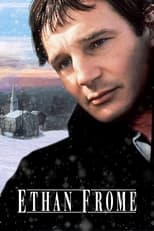CRCulver
Sep 13, 2018
4/10
The 1993 British-American television production Ethan Frome is an adaptation of Edith Wharton's 1911 novel about star-crossed lovers in late 19th-century Massachusetts. Though Wharton was a wealthy New York socialite, she had glimpses of New England village life, and it was the harsh winters, dire poverty and cruel gossip of this region that she sought to portray. The eponymous character (played by Liam Neeson) is a young farmer in the fictional Massachusetts community of Starkfield, whose dreams of making something of himself are dashed by the early death of his parents and then his marriage to the sickly Zenobia "Zeena" Frome (Joan Allen). When Zeena's cousin beautiful cousin Mattie Silver (Patricia Arquette) comes to help out in the house, Ethan's heart is thawed, but ultimately the uncompromising conditions of Starkfield life bring Ethan and Mattie to a tragedy.
The plot of a pair of star-crossed lovers is rather overdone, but Ethan Frome is interesting in its depiction of a Massachusetts village in the late 19th century, complete with characters speaking in dialect and a description of country farmhouses. This adaptation does a decent job of presenting those strengths of the novel. It also offers an improvement on the novel in that it tweaks Wharton's risible climax -- Ethan and Mattie deciding to escape this cruel world by sledding down a hill into a big elm tree, the stupidest means of suicide in all of literature -- to be more believable.
The adaption is flawed, however, by a number of factors. One is the decision to change the framing story of Wharton's novel. In the book, the visitor to Starkfield who spurs the flashback is an engineer who wonders why Frome is so taciturn. In this film, however, the visitor is the town's new preacher, just out of seminary, who protests against Frome being shunned by the town. Wharton's portrayal of a man who walls himself off by the world after multiple tragedies is replaced, then, by an element completely unknown to the novel: the castigation of the villagers as ignoring basic Christian charity. This has consequences for the ending, which is much less powerful than the novel. Another unwelcome change is that Ethan and Mattie sleep together, while in Wharton's novel the characters seem incapable under their dire circumstances of having even a physical relationship. Also, Liam Neeson offers some of the best acting in the film, but he's 10 years too old to play this role.
I first saw this film when it was shown on PBS nearly two decades ago, and it works well enough as passive entertainment on television, but this is a second-rate affair in many ways and I cannot recommend it.
